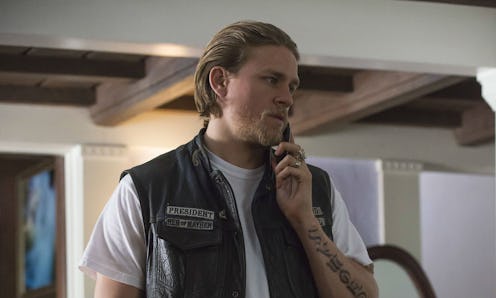
Tuesday night, Kurt Sutter's visceral motorcycle club drama Sons of Anarchy returned with more violence and emotional destruction than ever before. From Tara's prison fight, to watching Sutter's character Otto get sodomized in prison, witnessing the acts of a rape and torture porn ring, and the final scene in which an unassuming blonde schoolboy shoots his classmates with machine gun in broad daylight, Season 6 is off to an unsettling start. And while it's easy to cry foul when a cable drama makes seemingly exploitative use of our nation's fresh wounds following such tragedies as the shootings in Aurora, Colorado and Newtown, Connecticut, Sutter's heart-wrenching scene is far from a half-cocked attempt to shock audiences.
Sutter's ruthless FX series has never been one to shy away from a difficult story, in fact his willingness to tell stories that send viewers to a far darker place than any other drama on television is his trademark. He often gets blow back, but as anyone who's ever read his Twitter knows, he doesn't care one bit about our opinions; he's out to tell the story he's conceived, and oftentimes, that story is meant to make every single viewer more uncomfortable than they're willing to withstand.
This is a series that watched protagonist Jax's (Charlie Hunnam) best friend get beat to death with a lead pipe; it sent Gemma (Katey Sagal) into a den of white supremacist rapists where she was tortured endlessly; it forced Tig (Kim Coates) to watch as his daughter was burned alive. But not a single one of these unbearable moments has ever been used for a simple or crass disturbance. That's not Sutter's aim and it never has been.
So, when Tuesday's premiere sent an angelic schoolboy who, at the beginning of the episode, appeared to be some sort of flashback to a young Jax due to his striking resemblance to the MC leader suddenly lifted up his sleeves to reveal self-inflicted cutting scars, a notebook with phrases like "Pop goes the weasel" and "God hates bullies" next to devilish drawings, and finally a machine gun with a second magazine, it was important to remember that nothing on Sutter's show — no matter how violent or shocking — is done without consequence or reason.
When the blonde boy opened fire on his classmates, the camera waited outside, leaving only the rampant flash-bangs and small blood spatters on the school windows as evidence of the child's angry rampage. It was the most difficult SoA scene to watch to date, especially since the scene is followed with the surviving children escaping into their parents' arms as first-responders hold their heads in disbelief.
For our nation, this occurrence is all too real. And for a moment, I even wondered, "Did the scene really need to add the blood on the windows? Was there something that could have been done to lessen the reality of this scene? Did we really need to feel like we lived through that horrific moment?" In the realm of SoA, yes, we did.
The shooting is actually a moment that will set into motion the rest of the series, which is in its penultimate season. SoA has long been set up as a morality story, pitting the reality Jax knows against the consequences of his lifestyle and his choices. Next week — as the previews revealed — Jax will learn that the machine gun used by the troubled young boy was a gun that SAMCRO sold. Jax's life blood, his MC, is directly responsible for the onslaught of violence wreaked in this unbearable scene.
If the visceral nature of the scene was taken down a few notches, it would be easier to watch, but that's not the point. Not only would an easier-to-stomach scene go against SoA's approach to the last five seasons, it wouldn't create nearly the impact of the moral and social consequences of the MC's activities that Sutter and crew are setting up. A club involved in this dark world needs something so emotionally disruptive it can bring them to their knees after they think they've seen everything; this is one of the few consequences that could actually change the way Jax and his more morally sound cohorts view their lives and their dealings.
In the wake of Newtown and Aurora, we've come to worry about witnessing the glorification of gun violence in entertainment, but this horrific scene has not an ounce of glorification. If anything, in a single two-minute scene, all the "bad-assery" of the Sons' past five seasons is brought into question.
Our responses to watching the club shoot up their enemies or smack down a threat is brought into a new light: Did we cheer? Did we consider the ramifications of that violence? Have we thought about what this gang, even when its intentions are good, has wrought? And most importantly: after spending seasons hoping Jax and Co. would escape the clutches of the law, is it possible we're starting to think that the world might actually be better off if they're put away for good? The answer is starting to look more and more like a "yes."